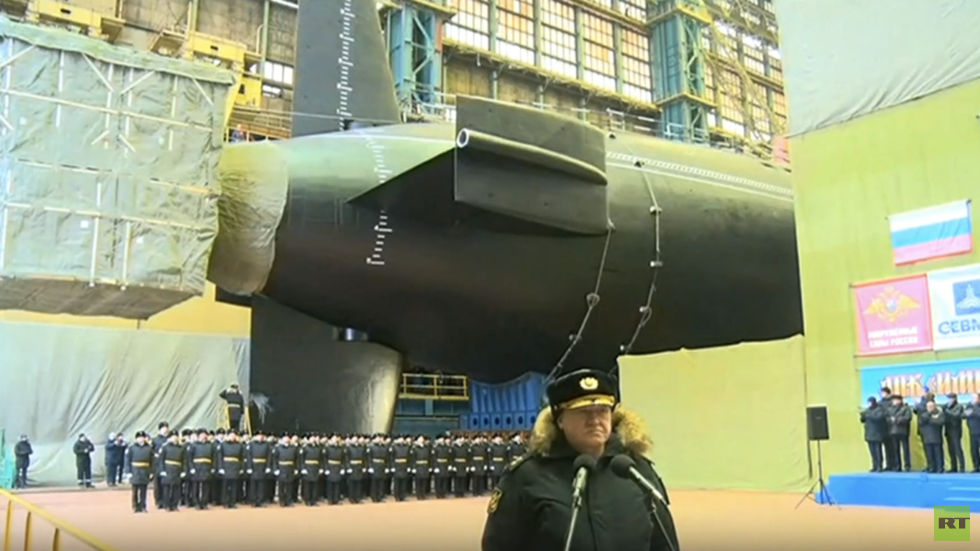A sixth Borei-class nuclear-powered submarine has entered service, while a seventh has been floated ahead of sea trials
A new advanced Borei-class nuclear-powered submarine was among three warships that entered service in the Russian Navy on Thursday. Another boat of the same class, which is designed to carry Bulava intercontinental ballistic missiles, was floated for the first time on the same day.
The Russian military conducted three simultaneous ceremonies, during which naval flags were raised on the new vessels, marking the formal beginning their active service.
The Borei-class submarine ‘Generalissimus Suvorov’ was the largest and most powerful of the three. The Borei class forms the backbone of Russia’s naval nuclear deterrence. It is the sixth ship of its kind and though the welcome ceremony was in the city of Severodvinsk in northern Russia, the ‘Generalissimus Suvorov’ is slated to join the Pacific Fleet.
President Vladimir Putin, who directed the ceremony remotely, noted that Russia was in the process of building four more Borei-class submarines, which he declared “will ensure Russia’s security for decades to come.”
The sister ship of ‘Generalissimus Suvorov,’ the ‘Imperator Aleksandr III,’ was floated in a separate, simultaneous ceremony at the same location. As the seventh boat in the class, it will undergo sea trials starting next June before entering military service, the Defense Ministry reported.
The two other ships that entered service on Thursday were the advanced Buyan M-class missile corvette ‘Grom’ and the Alexandrit-class minesweeper ‘Anatoly Shlemov’. Their flags were raised in the ports of Baltiysk and Vladivostok as they joined Russia’s Baltic and Pacific fleets respectively, in ceremonies coordinated with those in Severodvinsk.
The addition of the new assets was a milestone for the Russian Navy, the president stated. He expressed his gratitude to the designers and builders of the vessels and wished good luck and honorable service to their crews.
https://www.rt.com/russia/569118-russia-borei-nuclear-submarine/
Ghana is interested in purchasing a floating nuclear power plant from Russia, Ghanaian Ambassador to Russian Koma Steem Jehu-Appiah told Sputnik.
"I know that our minister of energy was here last year and signed a corresponding agreement. I think this is innovative, and in a conversation with the minister of energy, he said that the country is interested.
So, Ghana could purchase such a nuclear power plant," the diplomat said when asked about the possibility of Ghana purchasing a floating nuclear power plant.
Russia and Ghana began cooperation in the field of nuclear energy after signing an intergovernmental agreement in 2015.
The agreement outlined plans for joint work in the areas of training specialists, building nuclear power plants and related infrastructure, and providing maintenance services. In October 2023, representatives of Rosatom met with the Ghanaian Ministry of Energy in Cape Town. At the meeting, Russia proposed using floating nuclear power plants to supply power to ...














